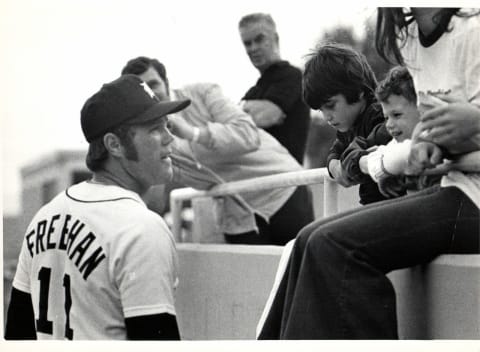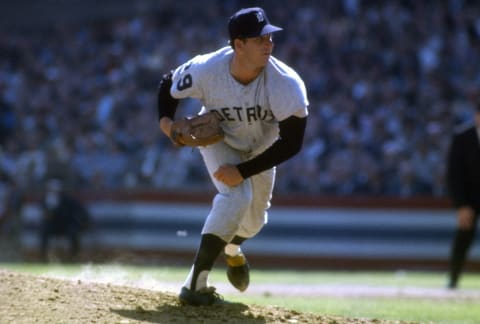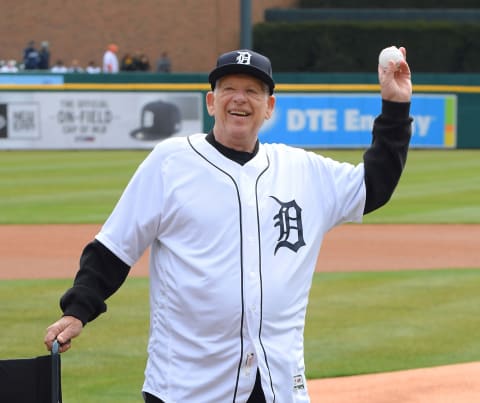Detroit Tigers: Mickey Lolich and Bill Freehan’s First Gem

Until recently, Detroit Tigers greats Mickey Lolich and Bill Freehan held the MLB record for most regular season starts by a battery.
Congratulations to Adam Wainwright and Yadier Molina of the St. Louis Cardinals on breaking the MLB record for most regular season starts together by a pitcher and catcher. With their 325th start on September 15, 2022, the Cards’ battery topped the former Detroit Tigers duo of ace lefty hurler Mickey Lolich and trusty receiver Bill Freehan.
Lolich and Freehan had held the record since August 4,1975, when their 317th start as batterymates passed the previous mark set by Hall of Famer Warren Spahn and Del Crandall of the Boston and Milwaukee Braves.
If there was a secret to the Tiger twosome’s success together, it seemed simple enough. In a 1968 Sport Magazine feature, Freehan summed up how he handled Lolich. The catcher said that Lolich was a pitcher who “needs to have his confidence attended to (and) needs to feel in control of the game. My job is to reassure him”.

Here is the story of the first game in which a young Mickey Lolich was in definitely in control on the mound while a young Bill Freehan crouched behind the plate. The date was April 24, 1964.
Two Young Tigers
Mickey Lolich, who debuted in May 1963, floated between Detroit’s starting rotation and its bullpen as a rookie. He impressed Tigers manager Charlie Dressen in Lakeland the following spring training. The 23-year-old left-handed pitcher (who did everything else right-handed) cracked the 1964 Detroit Tigers’ Opening Day roster and earned a spot in the rotation. Dressen boasted,
“The boy has a great arm. He throws hard and he now has control. The big thing is he’s getting a little smarter as he goes along. Oh, we still have to keep after him, the catcher and me. But that’s okay. That’s part of my job.”
The catcher that Dressen was referring to was Bill Freehan, who about to begin his second full season as a big leaguer. The 22-year-old former “bonus baby” from the University of Michigan got into 100 games in 1963, but only 80 as a starter. In order for Freehan to take the next step in his career, Dressen wanted him to become more of “a take charge guy back there”. That was something that the quiet and humble youngster had resisted as a rookie. The veteran skipper said,
“All he needs is more confidence in himself…I let him feel that way last season, but it’ll be different this year. Any good team has to have a take-charge catcher.”
Pre-Game Coverage
Minneapolis was the second stop on the Detroit Tigers’ first road trip of the 1964 season. The Tigers arrived in town with a 4-3 record. Their hosts, the Minnesota Twins, were 5-3.
Mickey Lolich drew the starting assignment for the Friday afternoon opener of the weekend series at Metropolitan Stadium. It was his second start of the year and the ninth of his career with Bill Freehan catching him. Lolich didn’t pitch against the Twins in 1963, but he knew exactly what he was up against in the early stages of this new campaign.
The Detroit lefthander stated, “They’re the best hitting team in our league. They don’t have an ‘out’ man in their whole lineup.”
Indeed, the ’63 Minnesota offense finished atop the American League in runs, hits, home runs, batting average, slugging percentage, OPS, OPS+, and total bases. The ’64 edition boasted not one, but two future Hall of Famers. Left fielder Harmon Killebrew had established himself as one of the AL’s most potent sluggers back in 1959. Right fielder Tony Oliva, who had only appeared as a September call-up for the Twins in each of the previous two seasons, went on to win the league’s Rookie of the Year award in 1964.
Bill Freehan returned to the Tigers lineup in this game. He missed four games over a five-day span with a bruised and swollen right hand. That certainly seems like one of the perils of being a catcher, but Freehan incurred the malady while sliding into second base.
Play Ball!
Thanks to an RBI single from Al Kaline in the top of the first, Mickey Lolich began his day with a 1-0 lead. He threw a 1-2-3 inning with Oliva making the third out on a fly ball to Willie Horton in left field. Killebrew led off the bottom of the second with a pop fly that first baseman Norm Cash gloved. Lolich retired the next two Twins he faced to wrap up another easy inning.
Zoilo Versalles, the 1962 AL MVP, drew a leadoff walk in the third inning. He didn’t get much further. Lolich induced a 4-6-3 double play off the bat of Bernie Allen and then made Dick Stigman his first strikeout victim of the day. One trip through the Minnesota lineup, and Lolich had faced only the minimum.
Lolich continued to roll in the fourth. He set the Twins down in order, and Oliva once again made the third out. This time he was retired on a pop-up that third baseman Don Wert caught in foul territory. Detroit added a run in the top of the fifth on back-to-back doubles by Wert and Jerry Lumpe.
Battling For Runs
Killebrew led off an inning for the second time in the bottom of the fifth and flew out to center fielder Don Demeter. Jimmie Hall struck out. With two down, the Twins finally got their first hit of the game when Earl Battey singled to center. Lolich hit Versalles with a pitch, and Minnesota had its first threat brewing. Undaunted, the Detroit lefty got Allen to hit a grounder to Cash, who made the play at the bag unassisted. Lolich did a nice job of getting out of his jam.
The Tigers rallied for three runs in the top of the sixth. Bill Freehan drove in one with a single. Detroit sent all nine men to the plate, which made for a long inning for Lolich. (The pitcher laid down a sacrifice bunt in his plate appearance that frame). The southpaw responded smoothly by striking out the first two Twins he faced in the bottom of the sixth. Vic Power then doubled high off Metropolitan Stadium’s 12-foot wall in left field, but Minnesota couldn’t capitalize. Oliva’s groundout to Cash ended the inning.
Killebrew led off the bottom of the seventh with a pop-up that second baseman Lumpe misplayed. Killebrew was able to reach safely and move into scoring position on the error. That didn’t spark anything for the Twins, though. The next three men up against Lolich all went down, two via strikeouts. Lolich notched another strikeout to begin the eighth inning. He gave up only a harmless single to Rich Rollins in holding Minnesota scoreless.
One Last Obstacle
Detroit manager Charlie Dressen sent Lolich back out for the ninth inning. In order to survive, the pitcher would need to get by the duo of Oliva and Killebrew one more time. He did just that. Oliva fouled out to Wert.
The Twins’ prized rookie had come into the game red hot. In his team’s first eight games of the season prior to this matchup against the Tigers, Oliva collected 15 hits (including eight extra-base hits), scored eight runs, and drove in seven. Lolich cooled him off with authority. At one point in the game, a close pitch sent Oliva down to the ground. Lolich later shared his game plan for handling the Twins’ three-hole hitter.
Mickey said, “I just moved the ball around on him. Outside corner, inside corner, here and there. No dusters. I don’t throw at batters”.
Killebrew hit the ball a lot harder off Lolich than Oliva did that inning. He drove a pitch high and deep to left-center field. Demeter caught it with his back against the wall, 400 feet away from home plate. The hitter known as “Killer” had earned his nickname at the expense of many an American League pitcher, but not this time. It was close, though. The wind held up Killebrew’s blast. He would finish the 1964 season with 49 home runs.
The long flyout was the most tension the Twins had caused the Tigers all day. Afterward, Lolich revealed, “My knees wobbled a little there in the ninth. The minute he swung, I said ‘bye, bye.'”
Minnesota’s two future Cooperstown inductees, Oliva and Killebrew, went a combined 0-for-8 against Lolich. Neither really ever figured out how to solve the rotund hurler. Killebrew, who had more plate appearances (114) against Lolich than any pitcher, hit .200 /.298/.400. Nobody faced Oliva more than Lolich and the New York Yankees’ Mel Stottlemyre (116 PA for each vs. Oliva). Against the longtime Tiger, Oliva hit .211/.233/.349.
The Twins were down to their final out. Jimmie Hall drew a walk. That was only the second base-on-balls given up by Lolich in the game. Hall’s appearance on the basepaths was merely delaying the inevitable. The next man up, Joe McCabe, flew out to Horton and brought the contest to a close. The Detroit Tigers topped the Minnesota Twins, 5-0, and Lolich pitched the first shutout of his professional career.

Post-Game Coverage
When Mickey Lolich and Bill Freehan began to work in tandem for the Detroit Tigers in the early 1960s, pitch-count data was not as copious or as widespread as it is today. Tom Briere of the Minneapolis Tribune stayed on top of it that day for the benefit of his readers in the state’s Twin Cities. He reported that Lolich threw 78 strikes and 44 balls (for a total of 122 pitches).
Freehan was behind the plate for two of Lolich’s four complete games the previous season. April 1964 was still early in the duo’s tenure together, but Freehan was comfortable describing what he’d seen from his southpaw against the Twins. He remarked,
“I’ve seen him when he’s had better stuff, but Mickey was throwing every ball where he wanted. Low, low, and lower.”
Before the season began, Tigers manager Charlie Dressen pointed out that Lolich’s control had improved down in Florida. The pitcher recognized it, too. As he put it, “I was always wild before”. Lolich’s walks per nine innings dropped from 3.5 in his rookie year in 1963 to 2.5 in his sophomore season in ’64. His season total would only rise above 3.0 just three more times in his career.
Lolich also got props from his defeated opponents. Rich Rollins touched upon Lolich’s control and was impressed with Lolich’s slider. He added that the Detroit lefty “kept the ball down and made you hit his pitch”. For Jimmie Hall, it was the curve ball that stood out.
Joe Falls of the Detroit Free Press noted that Lolich got six of his seven strikeouts on curveballs. Lolich had a different take on his arsenal than Falls or the pair of Twins did. Speaking with Briere, Lolich said that he threw a combo of a curve and a slider. He commented, “It breaks down and away a little, but doesn’t fall off the table”. Lolich also called his fastball his best pitch, although he joked that he “couldn’t break a pane of glass” with it.
Detroit’s young batterymates each had a nice season in 1964. Bill Freehan caught 25 of Mickey Lolich’s 33 starts in 1964. The other eight were handled by backup Mike Roarke, who became the Tigers’ pitching coach in 1965. Only right-hander Dave Wickersham (36) made more starts for the team that year.
Lolich finished the season with an 18-9 record, 3.26 ERA, 1.121 WHIP, and a 133 ERA+. He led the Tigers staff in complete games (12), shutouts (6), and strikeouts (192). Freehan became a first-time All-Star by hitting .300/.350/.462 with a 122 OPS+. His batting average led the team, and only Jerry Lumpe (160) got more hits than Freehan (156).
“Here To Stay”
In the game coverage that appeared in the next day’s Free Press, Joe Falls, the longtime Detroit scribe, wrote that Lolich handled the vaunted Minnesota Twins lineup “almost as though they were little leaguers.” Impressed by what he’d seen from young Mickey Lolich on the Minneapolis mound, the reporter surmised that “maybe he is here to stay”.
Falls was right. Lolich stayed with the Detroit Tigers until he was traded to the New York Mets for Rusty Staub in December 1975. The likeable left-hander will always be remembered for his 1968 World Series heroics, and his 300-strikeout season in 1971. He still holds the franchise record for starts (459), shutouts (39), and strikeouts (2,679). Lolich’s 207 wins rank him third on the Detroit leaderboard, and he’s in sixth place with 190 complete games.
Freehan was with Lolich all the way. He was behind the plate for the lefty’s first big-league start, a five-inning stint on the road against the Baltimore Orioles on May 21, 1963. The last time that Freehan grabbed his catcher’s mitt and donned the gear for a Lolich start was September 8, 1975, an eight-inning complete game against the New York Yankees at Shea Stadium. (Both, unfortunately, were Tigers losses.)
Nobody caught more games for the Tigers than Freehan, who appeared behind the plate 1,581 times (including 1,506 as a starter). Oscar Stanage (1,072) and Lance Parrish (1,039) are the only others who reached the 1,000-game mark at that position in Detroit.
Mickey Lolich and Bill Freehan were inducted into the Michigan Sports Hall of Fame together in 1982.

Next. The 1961 Tigers' 100th Win Was an Odd One. dark